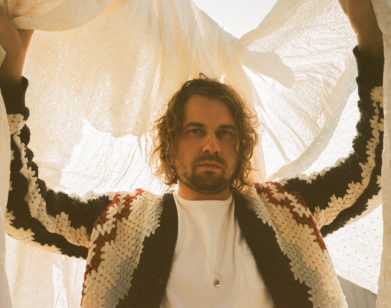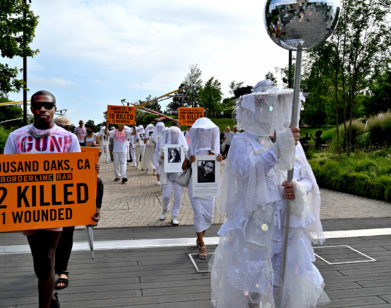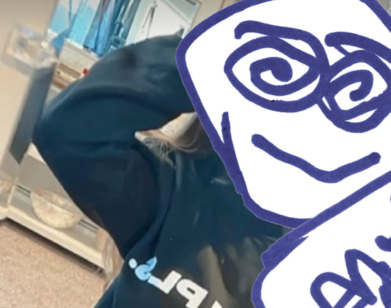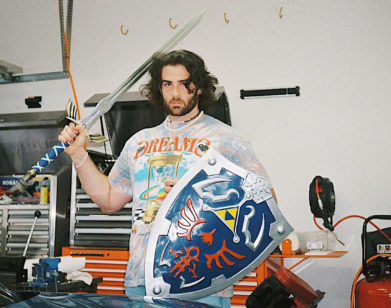In Conversation
Jonny Sun and Lin-Manuel Miranda on Text Friendships, Connection, and the Perfect Metaphor of Eggs
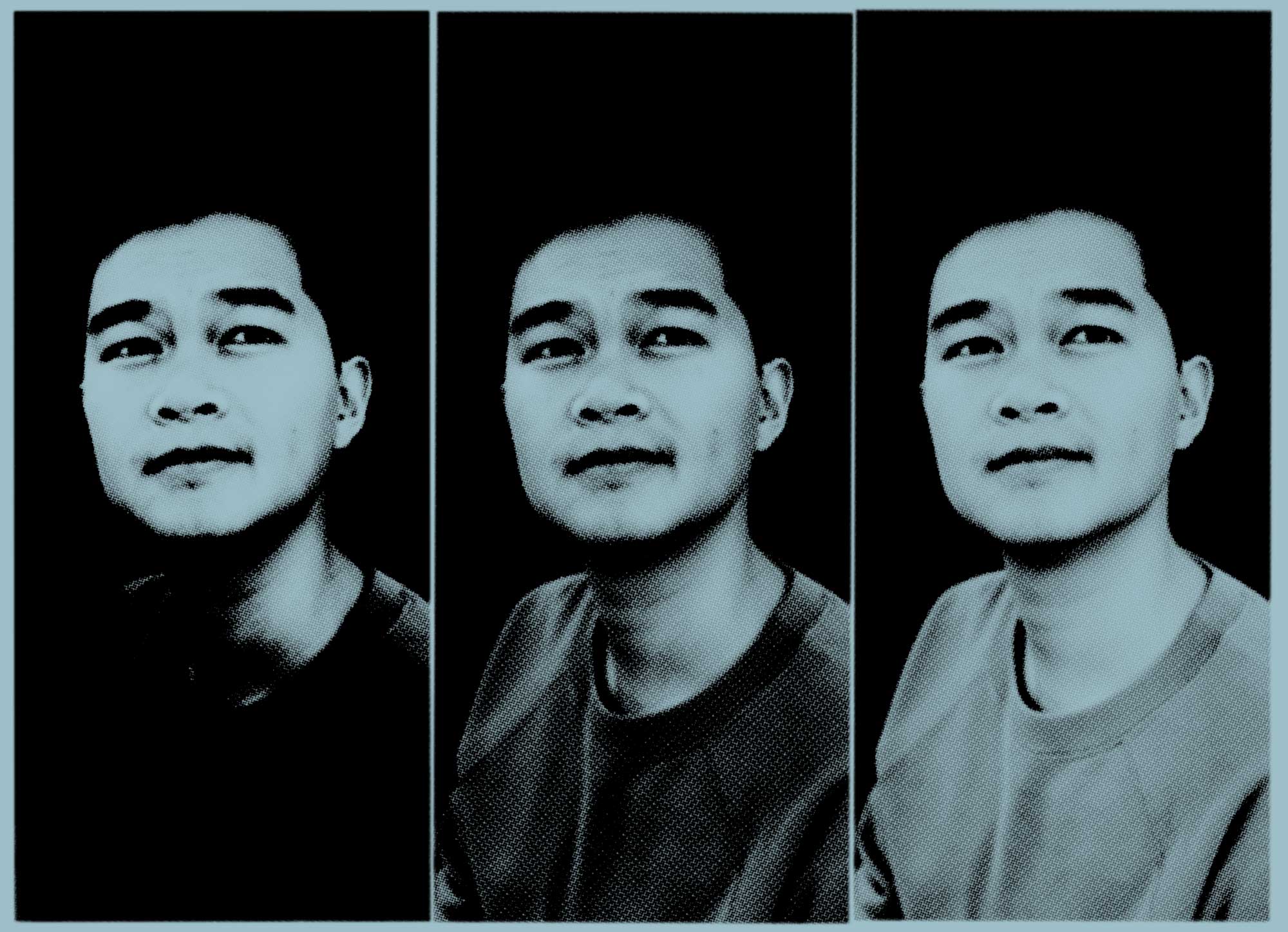
Jonny Sun is a creature of the internet. His poignant musings on life, love, work, and happiness have gained the BoJack Horseman writer a following of more than half a million people on Twitter, and were turned into his bestselling first book, Everyone’s a Aliebn When Ur a Aliebn Too. Twitter also brought Lin-Manuel Miranda into his life: The two became friends via Twitter DMs before making the jump to so-called “real life”—a distinction they would argue might not exist. They went on to collaborate on Gmorning, Gnight!, a book based on Miranda’s habit of tweeting daily affirmations and greetings each day, illustrated by Sun. Nowadays, their friendship is largely sustained via text message and group chat, a mode of communication at once intimate and casual, which becomes more profound over time. As Miranda told Sun when they connected last week, that sense of larger meaning accruing and deepening over small moments in time is what makes Sun’s latest book, Goodbye, Again—a collection of essays, stories, poems, illustrations, and at least one egg recipe that seems to have made half the internet burst into tears—such a wonderful read. —EVELINE CHAO
———
LIN-MANUEL MIRANDA: Hello, friend. I felt so seen reading your book. You find these very specific inner thoughts and voice them in a way that I’m like, “Oh, how’d you get in my brain? How did you, while living a completely different life and experience, also feel the thing I feel?”
JONNY SUN: Thank you. It’s nice to hear, especially coming from you.
MIRANDA: Do you want to start with how this began?
SUN: I think the idea for this started running around in my head as we were doing our book, Gmorning, Gnight!
MIRANDA: Your book feels like the inverse of that book. That book was my way of keeping office hours on Twitter and gauging where I was inside myself. But this is not, “How do I feel this morning right now?” This is more, “Wait, how do I feel?” I can feel you trying to take the work out of work and slow down and zoom out, as opposed to these zoomed-in snapshots of your life in a given moment.
SUN: Yeah, I was trying to do that. A lot of it felt similar, though, where I started without knowing it would be a book. It was just a collection of stuff I hadn’t found a way to wrap my head around, that I’d been trying to figure out how to talk about, or put words to. I was just going about my life and every so often, whenever I had a thought, I was like, “Oh, I need to write this down or else I’m going to forget it.” I did that for a while and then I had 200 or 300 little iPhone notes on my Notes app.
MIRANDA: So you really wrote them in your phone.
SUN: Yeah, I didn’t sit down and scrawl on a manuscript by candlelight. They started as little notes, about, “Oh, I think I figured this thing out about the way I view work and the way I view meaning with my life.” Usually, they were just a couple of lines or a prompt, like, “Write about Schrödinger’s cat from the cat’s perspective,” or something. And then they kept collecting until [my wife] Elissa was like, “Maybe this should be the next thing because clearly, you’ve been drawn to writing this stuff and maybe there’s something in there.” I started looking and understanding that there were themes, and a lot of things that complemented each other, like the relationship between meaning and productivity. And loneliness and displacement and trying to fill the void. I didn’t realize those two went hand in hand, that whenever I moved to a new city or felt displaced or isolated, I would turn to work, and that would feed the loneliness, and then that would feed the hyperproductivity. The more I looked at it, the more these themes started to resonate with and circle each other.
MIRANDA: What’s so impressive about this is it does feel like a series of snapshots, but they accrue meaning over the course of the book. That comes in your caring for your plants. The first story you tell, the moment the plant starts to die, you throw it out. But as you continue to tell these plant stories throughout, your relationship to it changes, and each one is different, just like each interaction with a person is different. Is it worth talking about how we became friends? Because I think it’s relevant to your book.
SUN: My version is that I was a big fan of yours for a long time, since the Freestyle Love Supreme and In the Heights days. I had followed you on Twitter for a while, and at some point you followed me back, and then we became friends on Twitter.
MIRANDA: Everything you wrote was usually my favorite thing I’d read on Twitter that day. Whether it was funny, or poignant, it resonated with me in a way that lingered. And at a certain point, did we go from being Twitter friends to real-life friends, or were we already real-life friends interacting on Twitter? This is something you talk about in your essay so beautifully. I know that the first time we met in person, you came to Hamilton, and we got to spend some time together after the show.
SUN: We were talking and having that “first time you meet a friend you know from the internet” moment.
MIRANDA: And it’s compounded by the difficulty of, I’m at the stage door and there’s hundreds of other people there.
SUN: Yeah, you were like, “Let’s go across the street,” and I was amazed that no one followed us across the street.
MIRANDA: That is something that I mourn because that was the level of fame I was very comfortable with: famous for exactly one city block, and then I’m going across the street and we all treat each other normally. I always wait for it to come back to that and it has not.
SUN: I think we got pizza. And you said something I still remember. You said, “You’re a really good writer,” and that was really formative for me, because you were someone that I deeply admired and still do. Just getting that little nod of, “Whatever you’re doing, keep doing it,” was really meaningful for me.
MIRANDA: So many of the things you discuss in the book resonated with me, because they also resonate with our relationship. When we worked on Gmorning, Gnight!, that was fun to work on, but the more fun thing was deepening our friendship beyond Twitter DMs. It was like, “You have to come over to my house.”
SUN: Right. We have to watch My Neighbor Totoro.
MIRANDA: I don’t really remember working on the book. I remember hanging out with you, watching My Neighbor Totoro with my kids, and taking our dog to the beach. For me, that book is a document of our friendship.
SUN: I really wanted to treat it like a biography project. I always say it’s like a portrait of my friend through a hundred drawings, where none of them are his face.
MIRANDA: Your essay “How to Cook Scrambled Eggs”—I think the mark of a great piece of writing is that as soon as I was done, I had five people I wanted to send it to. It is such a snapshot of how we absorb the lessons of our parents. And how it’s not automatic and there is an active portion of what we choose to take and what we choose to pass on.
SUN: That essay is told, ostensibly, through a series of recipes for egg dishes—steamed eggs, tea eggs, hard boiled eggs, soft boiled eggs—but all the recipes are more about memories of my life. I was really trying to place my understanding of each of these egg dishes throughout my life, from my childhood and the type of things that my parents made growing up and the comfort foods that I had as a kid, to my coming of age.
MIRANDA: Eggs are such an adult starter kit, right? People who can’t cook make eggs, and you can stay on the surface level of, “You put them in the pan and something will happen.”
SUN: Exactly. They are very simple and also very versatile and very reliable.
MIRANDA: A reaction will happen. As long as it doesn’t stick to the pan, something will happen that you can eat. And you can go as deep or as shallow as you want in the egg world.
SUN: I was trying to capture this big idea of the things that we inherit from our parents and from each other. And I thought it was funny to do it in the silliest way possible, which was looking at eggs.
MIRANDA: There is the recipe of the tea eggs, which we first see as a snapshot of you as a child, wondering about the process as a mysterious thing. “What’s the brown liquid about? I’m going to keep coloring, but I really like the tea eggs.” And then there is that separate snapshot where you’re with Elissa and cracking your egg by tapping it all around and she goes, “Why do you open your eggs like that?” But you don’t provide the answer there. And the answer isn’t until the ending when you actually get the full recipe for tea eggs in a series of texts from your mother, and the cracking the egg comes back around: “Oh, that’s why I do that like that.”
SUN: Right, because it’s a tea-egg recipe step.
MIRANDA: It’s such a beautiful metaphor and it is so beautifully constructed. I also want to talk about plants. Because I felt there is like a very knowing inverse of The Giving Tree that goes on in this.
SUN: Yes. I have this one.
MIRANDA: You are like, “What do my plants want? What do they need? I have to give them everything they need so they thrive. I will be a stump if I need to so that this plant can flourish and I can experience how it flourishes.” But The Giving Tree is all about how the tree will do anything for the child, and it’s a lovely, if slightly masochistic, metaphor for parenthood. But, in your inversions, there is also what the tree learns from the child. You are also learning from these plants as you do research and spreadsheets and figure out how to keep them alive, and make mistakes, and get impatient, and realize the plants are going at the pace they are going to go, or living the way they know how to live, and trying to teach you to do the same.
SUN: Yeah totally. My hot take on The Giving Tree is that I don’t think it was meant to be an aspiration story, the way the culture has taken it. I think that story works best when you read it and you’re like, “What the heck? Why did this kid just take everything from the tree?” I always thought of it as more like a warning fable, that if you take everything from someone, you’re going to leave them as a thing and you’re not even going to understand what you’ve taken from them, if you don’t pause and think about it.
MIRANDA: Yes.
SUN: And that was another question of, how do I zero in on something really small and casual? That’s just how I interact with my houseplants, because I am constantly worried that they are going to die on me. I love them so much, and I want them to be fine, and I try really hard. But the heartbreaking thing is that sometimes they end up dying anyway. I wanted to write about that in a way that is not just, “Oh, I couldn’t take care of my plants,” but that expands and talks about grief and mourning and loss. Whenever I think about those topics, and try to write about them in big ways, I feel like I’m not a good-enough writer to talk about big ideas with big stories. By zooming into these small things, I feel like I can write about them.
MIRANDA: I will never forget the cactus that you forgot about, but that your parents kept alive and grew. You say you’re not writing about big things, but you’re writing about your relationship with time, with your parents, and with permanence. As someone who has never taken care of a houseplant in my life, it still deeply affected me and made me think about my relationship with my pets, and my children, and my parents. I also want to talk about text friends. Because you and I are very good text friends. I never feel like you’re far from my life because we have our own text chain. And we’re in a little text group that is one of the biggest pockets of joy in my phone. It’s purely, “Here’s a sunset where I am.” “Here’s a sunrise where I am.”
SUN: Right. Look at this cloud that I saw.
MIRANDA: It is as big or as small as whatever joy we want to share that given day. It’s not even like life updates. They are these snapshots of where we’re at, and then we all just chime in. I was really affected by your AIM thing. Or was it Microsoft instant messenger?
SUN: This is the generational gap. It was MSN, yeah.
MIRANDA: There is a generational gap. It made me remember that I talked to my wife on AOL Instant Messenger for about six months before we started dating. That led to us meeting in real life. But it’s not the part of the story you tell folks about how you met. You only tell the “real-life” parts, right?
SUN: Right.
MIRANDA: But reading the way you discuss those friendships, and the way you feel like you can participate more fully because there’s not the anxiety around real-life interaction that sometimes inhibits what you can say in the moment—tell me about that distinction.
SUN: I’ve always believed that human interaction and the desire to connect and communicate is something that happens regardless of medium. So I’ve never had that scoffing thing of like, “Oh, if you’re just texting, that’s not actually talking and that’s not real or whatever.”
MIRANDA: Right.
SUN: I put so much value in that form of communication because, as you mentioned and as I write in one of the essays, I was, and still am, a very anxious person. Sometimes words don’t come to me very well. Maybe this is why we are both writers: There is a connection between the fact that you and Vanessa texted a lot, and Elissa and I got to know each other through text. We met in real life, but then most of the time we spent talking before we started even becoming friends, and then before we started dating, was through text.
MIRANDA: You two did long-distance a very long time.
SUN: After we started dating, we did long-distance for so long, where it was all through video chats and calls and texting. That’s where I learned that stuff is as real as in-person. But with the texting specifically, that’s where I realized I can be funny, and interesting, and hold a conversation too. With text, I have a little more time to get my words right or a little more time to figure out how to sequence them, so the thing that I say is more accurate to the thing that I wanted to say. I think that’s why our group chat is such a joy too, because it feels like we’re talking in a different way than we would in real life. I love that those two things complement each other, and I don’t see them as the same because I think there’s a different type of thought process that goes into each of them.
MIRANDA: The occasions when the text relationship can become a real relationship, and there’s equal communication and interaction in both, is very special and very rare. I do find I have analog friends that I don’t have great texts with. Like if I get a text, I just call them. And then I have one friend where our relationship was built on late-night college AIMs, and almost the entire relationship is still through texts. We’re very intimate with each other’s thought process because we were able to download into each other in that way.
SUN: Yeah. The closeness and the intimacy when you find a friend who understands text or operates at that level—it’s like, “Oh, it’s on.” We will have this conversation for the next decade and it’ll feel like it’s a constant one that we continue to revisit and build upon. There’s something really special about that.
MIRANDA: You have a beautiful essay about being in a moment, but also connecting with the past version of you, and wondering what they would think of this moment. Would they like the person that you are right now? And would the future version of you think, “Wow, that version of me was so productive,” even if in the moment you don’t feel so great?
SUN: Right.
MIRANDA: I always talk about how one way I define myself as an artist is to ask, am I making work that 10-year-old me would enjoy? Or 16-year-old me, or 21-year-old me? With In the Heights coming out, the songs that affect me the most now are Kevin’s song and Abuela’s song because I get to look at 26-year-old me and go, “Shit, Lin. Good job on the last track. You didn’t know what the fuck you were talking about, but I’m a dad now and I’m feeling it, so well done, kid.”
SUN: Yeah, you did some time traveling. One of the things that unlocked a key to writing for me was my first editor for Everyone’s an Aliebn. I remember being like, “I don’t know if I have the tools or the ability to write everything that I need for myself right now. I don’t know if I can capture all that.” And he was like, “So write it for you from five years ago. Think about what that person needed.” That unlocked something in me because I had always thought of readership, or performance, or audience, as other people. But with this new book, I’ve been thinking of audience as all the former and future versions of myself. If this were never published, I would still be happy because I wrote it for the infinite number of younger versions of myself. There’s something really cool about feeling like you have all the audience you need, because it’s you, but also all the different versions of you. The scary thing about that too, though, is that the book has only just come out, but I already feel like I’m talking about someone else’s book.
MIRANDA: One hundred percent.
SUN: I already feel like, “I didn’t write this. Someone else wrote this and now I’m the jerk who gets to take the credit and reap the joys of having it come out. And poor me from the last three years, who did this, doesn’t get to be around to experience this.” Any sort of creative work resembles a time capsule. It’s not one thing that is true forever, but, at best, a thing that is true for this one focused moment of your life. I think that’s all you can ask for. It’s a way to memorialize that version of you into something.
MIRANDA: What has been your parents’ reaction to the stories in the book? And were your parents in your mind when you were creating it?
SUN: That’s a great question… I’m clearly stalling and trying to figure out the answer because… Well, I guess one of the answers is that I was very nervous.
MIRANDA: It will just be a snapshot of the answer. The future you could disavow it if necessary.
SUN: Perfect. I did feel very nervous because my parents are very private people and, when we’re talking about the things we inherit from our parents and from other people, there is that feeling of wanting to be private, but also wanting to bare your soul. I think the product of that is baring your soul, but by talking about plants. There’s that weird subversion where it’s like, “I’m going to say everything I want to say, but also say it through these focused ways so that it still feels like I can be private, but also be very open.” I was very nervous about what they would think. I wrote it with the idea of, “Oh, if they don’t like these pieces, I can cut them. It’s fine, I have enough other stuff that if there’s something that doesn’t sit well with them, I’m happy to edit that out.” But then they read it and were thrilled.
MIRANDA: Did you watch them read it?
SUN: I didn’t. I was too scared. But they were really overjoyed with the fact that I remembered all that stuff. My parents are deeply sentimental people. Whenever my brother and I are around them, they will talk about memories and tell stories of us as kids, stories of us as adults. I guess we are the only topic of their stories.
MIRANDA: You’re the only topic of their stories to you.
SUN: That’s a good point. But I think they were thrilled that suddenly they got to be the topic of my stories. And when we talk about the theme of inheritance, I hope that I speak about them as lovingly as they speak about me when they tell me those stories.
MIRANDA: That’s beautiful. I love you Jonny Sun. I’ll text you later.



